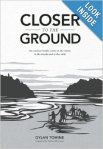The JLT Natural History Society Book Club will meet at 3:30 pm on Monday, April 28 to discuss A Year in Paradise, by Floyd Schmoe.
In midwinter 1920, Floyd Schmoe and his bride struggled up Mount Rainier on snowshoes on a long-delayed honeymoon. As the new caretakers at Paradise Inn, they would be alone in a towering world of snow and ice and incomparable beauty, until the plows arrived to free them on the fourth of July. So began a long love affair with Mount Rainier. And here is Floyd Schmoe’s account of it; a delightful and informative portrait of a mountain through the seasons of the year.
Through his personal narrative, Schmoe writes of many things that combined to cast a spell on him: the shy mountain goat, the reproductive processes of trees and plants, techniques of climbing, the habits of glaciers and volcanoes, the curious fact of a mouse being found at very high altitude, the peculiarities of tourists — and much more. This is a book for anyone drawn to the mysteries of the high country.
The author was the first naturalist for Mount Rainier National Park and a two-time nominee for the Nobel Peace Prize.
Please contact Pat at jltnatural@saveland.org for location and details.
This event was attended by nine people.




